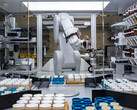Google's AI subsidiary DeepMind has developed a robotic arm capable of playing table tennis at an amateur level. The system can execute various shots, including backhands, forehands, and even handle balls that graze the net.
In a recent study, DeepMind's robot competed against human players in 29 full matches, winning 13 games. While it struggled against advanced players, the robot demonstrated impressive skills against beginners and intermediate opponents.
The development process involved a two-step approach. Initially, the system mastered hitting techniques through computer simulations replicating table tennis physics and gameplay. Subsequently, the team refined these skills using real-world data.
During live matches, the robot employs two cameras to track the ball's position. It also utilizes motion capture technology to monitor the human opponent's movements via an LED-equipped paddle. This data feeds back into the simulations, allowing the system to continuously improve its tactics.
Pannag Sanketi, the DeepMind engineer leading the project, expressed her surprise at the robot's performance. "The way the robot outmaneuvered even strong opponents was mind-blowing," Sanketi said. "Even a few months back, we projected that realistically, the robot may not be able to win against people it had not played before. The system certainly exceeded our expectations."
Despite its achievements, the robot faces limitations. It struggles with extremely fast shots and low-skidding shots. The system also has difficulty countering exceptional spin, as it cannot measure ball rotation.
It's worth noting that DeepMind's robot is not the only AI-powered table tennis system in development. Omron's 7th-generation Forpheus robot takes a different approach, focusing on assessing player interaction and emotion. Using six cameras, Forpheus captures players' expressions, heart rates, blinks, and movements in real-time. It analyzes the synchronicity in behaviors and emotions between players to gauge their internal empathy and kinetic coordination, potentially improving team performance.
DeepMind researchers believe that upgraded predictive AI modeling and improved collision detection could address these challenges. While the project may seem recreational, it represents a significant step towards developing AI capable of performing complex physical tasks safely in natural environments like homes or warehouses.
The study highlights the ongoing pursuit of human-level speed and performance in real-world tasks within the robotics research community. As AI and robotics continue to advance, projects like this table tennis robot demonstrate the potential for machines to interact with humans in increasingly sophisticated ways.
Source(s)
TechnologyReview (in English)

















